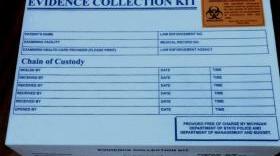All of Detroit’s 11,304 backlogged rape kits – discovered abandoned in an evidence locker six years ago – should finally be tested for DNA by the end of this month.
It’s a major milestone, even as the city can’t afford to investigate or prosecute all of these rapes, and has had to look to private foundations to start a $10 million fundraising effort.
Forensic detectives: finding the rapist from the rape kit
At first, money to test the kits came in fits and starts.
Only one in four of the backlogged rape kits will yield results
Then the state of Michigan set aside $4 million, most of which is going to send the kits to private DNA testing labs.
Those labs will analyze swabs and other evidence for DNA evidence: if found, technicians start assembling a “genetic profile,” which is comprised of up to 13 genetic markers.
Even if a kit does yield DNA evidence, not every kit will yield a full genetic profile.
That’s why the labs then send their results back to the Michigan State Police forensics labs.
It’s the MSP’s job to look over these outside results for accuracy, and to determine whether a genetic profile is complete enough to be uploaded to the state and the FBI databases.
Those databases are comprised of convicted offenders and people who have been arrested for any of 23 felonies (in Michigan, it’s legal for police to take your prints and DNA if you’re arrested for certain felonies.)
Only one in four kits will yield results that police can use
About 5,500 kits have gone through this entire process so far.
"This crime especially, the majority of our biologists are female. We've got about 60 across the state and 90% of them are females. Not to say the males take this any less seriously, but we’ve got a committed group of women here."
Just 1,200 of them have actually yielded “investigative leads,” as MSP forensics director Greg Michaud puts it, "meaning we’ve linked cold cases to cold cases, or we can actually identify the DNA profile of an individual [who is an offender in our databases].”
At the end of the day, only one in four of the abandoned rape kits is going to have enough DNA evidence for prosecutors to pursue, Michaud says.
“Fifty percent of the kits come back with genetic information, meaning the other half are negative.
“Of the positive ones, less than half of those will lead to an investigative lead.”
But even when they do get a lead, sometimes they don’t have an actual offender to investigate.
That happens when a sample from these rape kits matches an unknown sample in the FBI or state databases.
“We don’t know who that offender is, just that they’ve committed more than one crime,” Michaud says.
A forensics team that’s 90% female
Despite all of those setbacks, and the fact that these backlogged rape kits are on top of the current kits they’re sent on a daily basis, he says this is the kind of work forensic biologists love to do.
“This is the exact reason they got into forensics. They know the impact they’re having on people’s lives, and the closure they’re bringing to families.
“This crime especially – the majority of our biologists are female. We’ve got about 60 across the state and 90% of them are females. Not to say the males take this any less seriously, but we’ve got a committed group of women here.”







